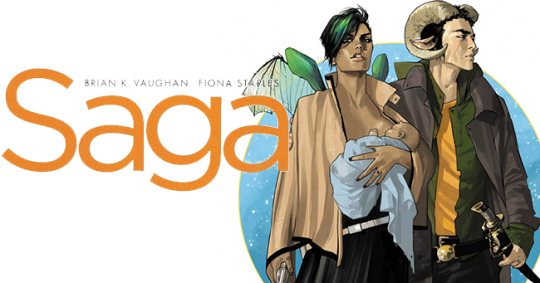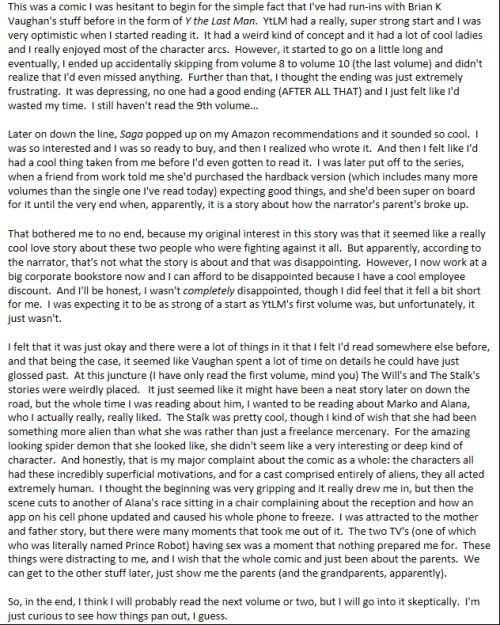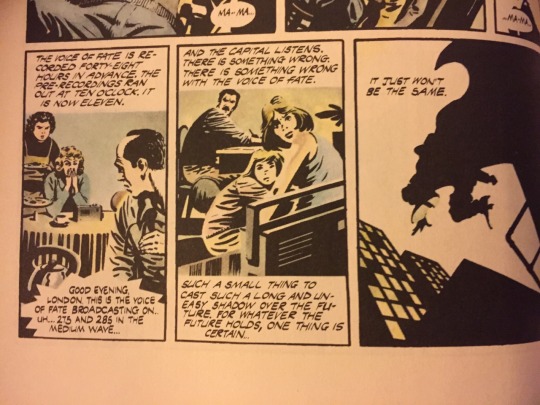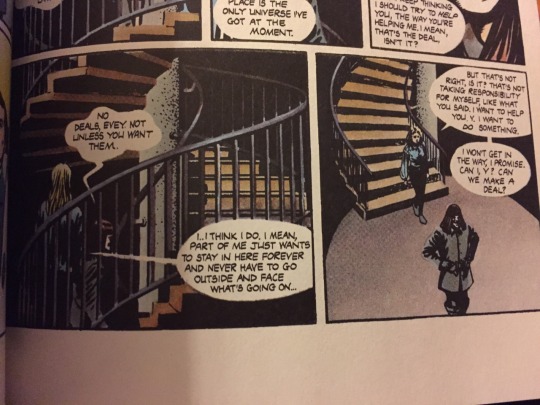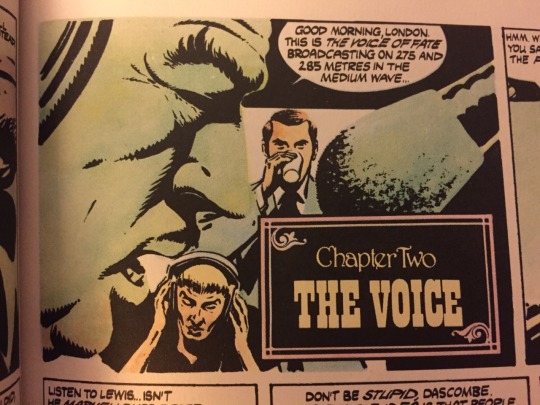Thing I forgot Number One:
So, this first one, is kind of a weird, minor nit-pick, but it was something I kept noticing as I started reading through the comic. As far as I can tell, CLAMP did not actually set a date for the series, and instead leaves the reader to assume that this takes place in some nonspecific future-time. That in and of itself is absolutely fine, as you don’t really need a year for this kind of story. However, because this was published between the year 2000 and 2002, and subsequently written in the late nineties and early two thousands, the terminology itself and the concepts behind how computers work actually dates the series pretty hard. It essentially takes place in the year 2000 except that computers are shaped like people now, and Hideki exists as the reader’s proxy to be told what all this technology does and what all these abbreviations mean. This is not bad per se, but it almost seems as though the comic would be better served without including that kind of “educational” information. It slightly slows pacing (which is something this manga did not need help with) and just opens the series up for modern-day criticisms like these. My examples from the first volume are minor, but talking about things like USB, BBS, and screen-savors for machines not using screens seem unnecessary, and legitimately took me out of my reading for a minute each time because I, from nearly two decades later, know that we are far past USB, that BBS is really not called BBS anymore, and that screen savers for devices without screens are just called sleep-mode (a term which is actually used in a later volume, weirdly enough).
Maybe I’m being a little rude, ragging on CLAMP for not future-proofing their tech lingo, but it was just kind of silly to me to include things like that in the first place. This is not a sci-fi manga, it’s a sienen manga about the finding that special person just for you (which we will discuss at a later date because good lord). Anyway, moving on…
Thing I Forgot Number Two:
I forgot that this was a sienen-type manga! I associate CLAMP with shoujo such as Magic Knight Rayearth and Cardcaptor Sakura, so this being targeted towards young-adult males was kind of a twist for me. However, I think the reason I forgot who the target audience was is because while the plot is about something very sweet and idealistic such as finding your one true love, the framing is… awkward. I of course remembered the infamous scene where Hideki finds her power button (which, knowing who created her and why, is mildly troubling), and I did remember some trouble with her and clothing, but I think I largely let these go because they seemed to be a part of the story and a part of learning about Chi.
What I did not remember was a scene where Shimbo just sort of nonchalantly picks Chi up by the legs to look at her vagina for a serial number (why is that where that would be??), or that Minoru has surrounded himself by sexily-clad maid persocoms who tackle Hideki with their with their breasts when he arrives, or that one of Hideki’s number one reasons for wanting a persocom is to download tons of porn. The men are almost written like what a female’s perspective on teen and young adult men might be: they constantly think about sex, and if they can’t have it, they will surround themselves with all the iconographies of sex.
Like… Minoru is a young, dignified, and highly intelligent. Why does he feel the need to surround himself with barely-dressed persocoms? This might tell us something about his character, but it’s never mentioned, and he never represents himself as a character who cares about sex, or porn, or even what women look like besides Yuzuki, who is created to be like his sister and who is specifically the least sexualized persocom he owns. Run-on sentences aside, a lot of this does nothing to serve the story and simply there to be funny or to take up pages with pin-ups.
At the same time, while everyone else gets to be comfortable in their sexuality and who they may or may not like or love, Hideki is constantly made to feel embarrassed about it. Everyone else gets to talk about their equally inappropriate feelings (we’ll get to these relationships later…) with confidence and without an ounce of shame while Hideki receives nothing but lighthearted jabs about what a pervert he almost every time he has a conversation with someone. Whether Shimbo is making fun of him for wanting to buy Chi underwear because she doesn’t understandthe concept of modesty, or whether his landlady is slowing backing out of the room saying “it’s okay, it’s a guy thing” as Chi undresses in front of the TV and calls herself a side-dish (WE’LL GET TO THIS, TOO), Hideki is just kind of doomed to question every decision he makes as everyone around him makes their fun. Sex and sexy things are so heavily emphasized in this volume, and it takes up a lot of the “run-time.” It’s a lot of superfluous jokes about how bashful Hideki should be when I’m actually very interested in reading about where Chi came from and what brought her to where she is now. You really don’t find out very much about her beyond the fact that she “might” be a Chobit (I mean, obviously she’s a Chobit).
Maybe it’s just one of those cycles of adolescence where you discover what sex is, but then you discover how taboo the topic is (well, was in the early 2000’s I guess), and then you become a sexually repressed protagonist of your own manga where you are constantly surrounded by beautiful women with amazing boobs who tell you their bra sizes unprompted or come over to your house in the middle of the night to drink beer and crash, but can’t do anything about it because it’s sooooo tabooooooo?
Who’s to say?
Anyway, that’s all for now. I thoroughly intend to write a one or two more entries about a couple of things that really threw me throughout my reading, but I’ll be saving those for a day when I’m not sick as a dog.
Thanks for reading! -SR

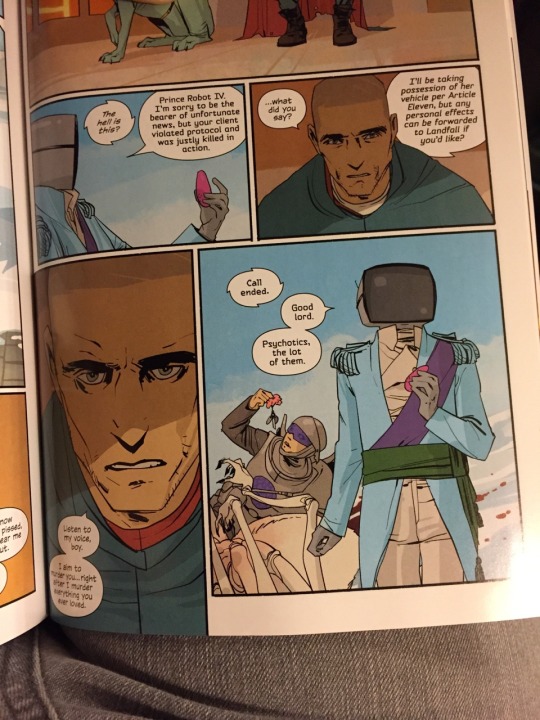 On one last note about Saga, I really enjoyed the art for the most part, but it kind of lacked impact regarding certain scenes such as this one. “Listen to my voice, boy. I’m going to murder you… right after I murder everything you ever loved.” That is a line that is said by a dark, gristly man whose just lost everything. For one thing, there is not enough attachment to The Stalk for the reader to garner this feeling and for another, the art and expression is completely bland here. He doesn’t look terribly angry, just… Like he’s talking to whoever.There is another scene which comes to mind: the scene in which Marko and Alana come to the Uncanny Bridge. There is a huge battle taking place, but they just kind of see it and leave, but the colors and the layout of the page just don’t drive anything home for me. Very bland there too, though I though that the giant-ass turtle with an entire camp on its back was awesome.
On one last note about Saga, I really enjoyed the art for the most part, but it kind of lacked impact regarding certain scenes such as this one. “Listen to my voice, boy. I’m going to murder you… right after I murder everything you ever loved.” That is a line that is said by a dark, gristly man whose just lost everything. For one thing, there is not enough attachment to The Stalk for the reader to garner this feeling and for another, the art and expression is completely bland here. He doesn’t look terribly angry, just… Like he’s talking to whoever.There is another scene which comes to mind: the scene in which Marko and Alana come to the Uncanny Bridge. There is a huge battle taking place, but they just kind of see it and leave, but the colors and the layout of the page just don’t drive anything home for me. Very bland there too, though I though that the giant-ass turtle with an entire camp on its back was awesome.